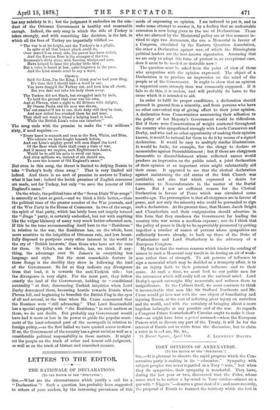LETTERS TO THE EDITOR.
THE RATIONALE OF DECLARATIONS.
[TO THE EDITOR OF THE "SPECTATOR."]
Sna,—What are the circumstances which justify a call for a "Declaration "? Such a question has probably been suggested to others of your readers, by the increasing prevalence of this mode of expressing an opinion. I am induced to put it, and to make some attempt to answer it, by a feeling that an undesirable extension is now being given to the use of Declarations. Those who are alarmed by the Ministerial policy are at this moment in- vited to sign two documents, the one a Memorial in favour of a Congress, circulated by the Eastern Question Association, the other a Declaration against war, of which the Birmingham political leaders are the best-known signataries. Assuming that we are only to adopt this form of protest in an exceptional case, does it seem to be needed or desirable now ?
The question must be asked from the point of view of those who sympathise with the opinion expressed. The object of a Declaration is to produce an impression on the mind of the people or of the Government. It ought to show that an opinion is supported more strongly than was commonly supposed. If it fails to do this, it is useless, and will probably do harm to the cause which it is intended to aid.
In order to fulfil its proper conditions, a declaration should proceed in general from a minority, and from persons who have no other convenient way of giving effect to their joint opinion.
A declaration from Conservatives announcing their adhesion to the policy of her Majesty's Government would be ridiculous.
But if there were Conservatives of weight scattered throughout the country who sympathised strongly with Lords Carnarvon and Derby, and who had no other opportunity of making their opinion known, it would be rational for them to do it by means of a signed declaration. It would be easy to multiply similar illustrations. It would be futile, for example, for the clergy to declare or memorialise against Disestablishment ; but if there are clergymen favourable to disestablishment whose collected names would produce an impression on the public mind, a joint declaration of their opinion at an important crisis might substantially aid their cause. It appeared to me that the clerical declaration against maintaining the old status of the Irish Church was justifiable, and also that which expressed a desire for concession to Nonconformists in the matter of the Burial Laws. But I saw no sufficient reason for the Clerical Declaration in favour of Peace which was circulated some months ago. The presumption is that all clergymen are in favour of peace, and not only the minority who could be persuaded to sign such a declaration. At the present time, that Messrs. Jacob Bright and Chamberlain and their cosignataries should advertise in this form that they condemn the Government for leading the country into war seems a needless expense ; nor do I think that the policy of peace is likely to be appreciably promoted by getting together a number of names of persons whose sympathies are sufficiently known already, to back up those of the Duke of Westminster and Lord Shaftesbury in the advocacy of a European Congress.
My fear is that the various reasons which hinder the sending of names to such a Memorial may result in its having an air of weak- ness rather than of strength. To ask persons of influence to
sign a memorial which may be derided as a trumpery affair, is to do an injury both to their personal influence and to their
cause. At such a time, we must look to our public men for the utterances which will really tell on the national mind. Lord Derby's speech outweighs fifty memorials, and reduces them to
insignificance. In the Cabinet itself, we must continue to think it inconceivable that men like Sir Stafford Northcote and Mr. Cross would go into war with the one object of humiliating and
injuring Russia, at the cost of inflicting great injury on ourselves and the world, and with the certainty of bringing about a more hopeless imbroglio at any possible end of the war. As regards a Congress Prince Gortschakoff's Circular ought to make it clear that—as might have been a priori assumed—when the European Powers wish to discuss any part of the Treaty, it will be for the interest of Russia not to retire from the discussion, but to claim a voice in it.—I am, Sir, &c.,


































 Previous page
Previous page